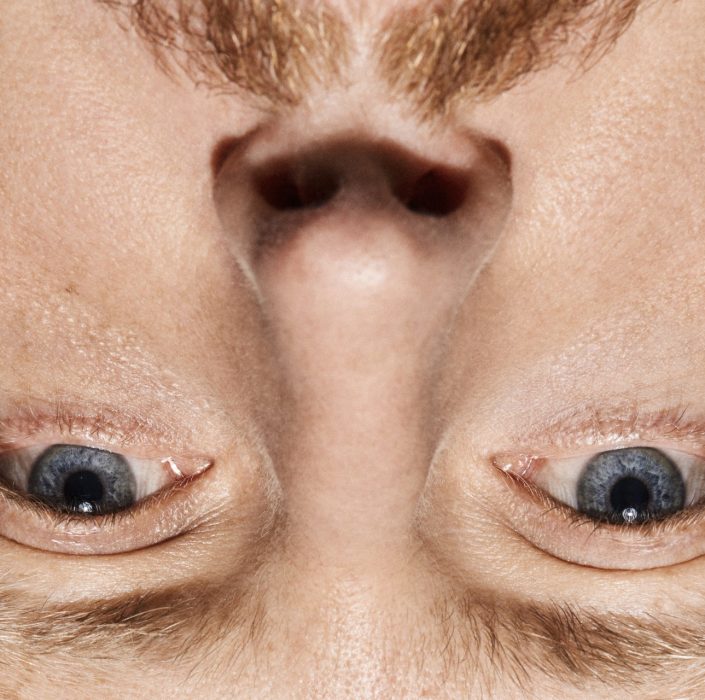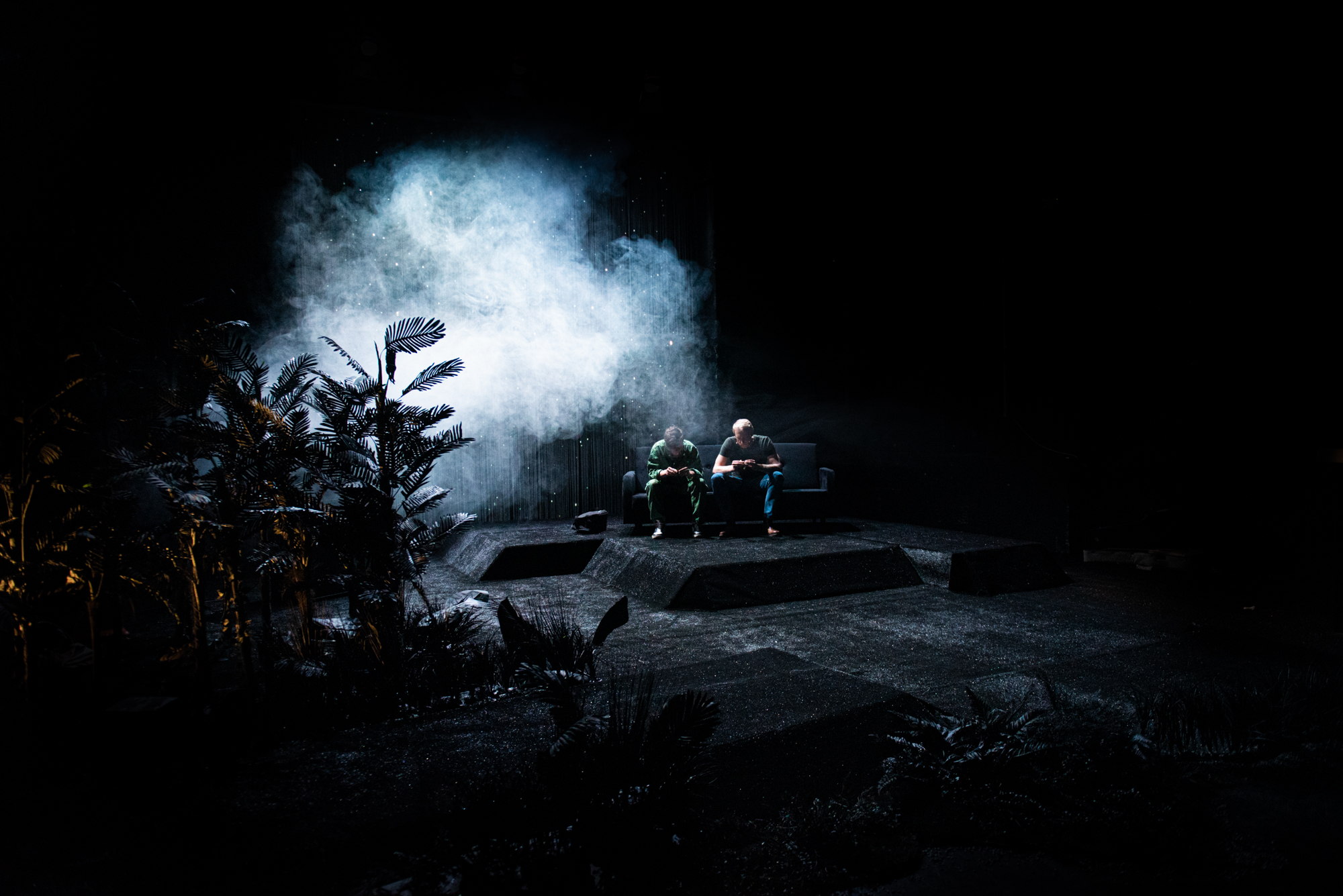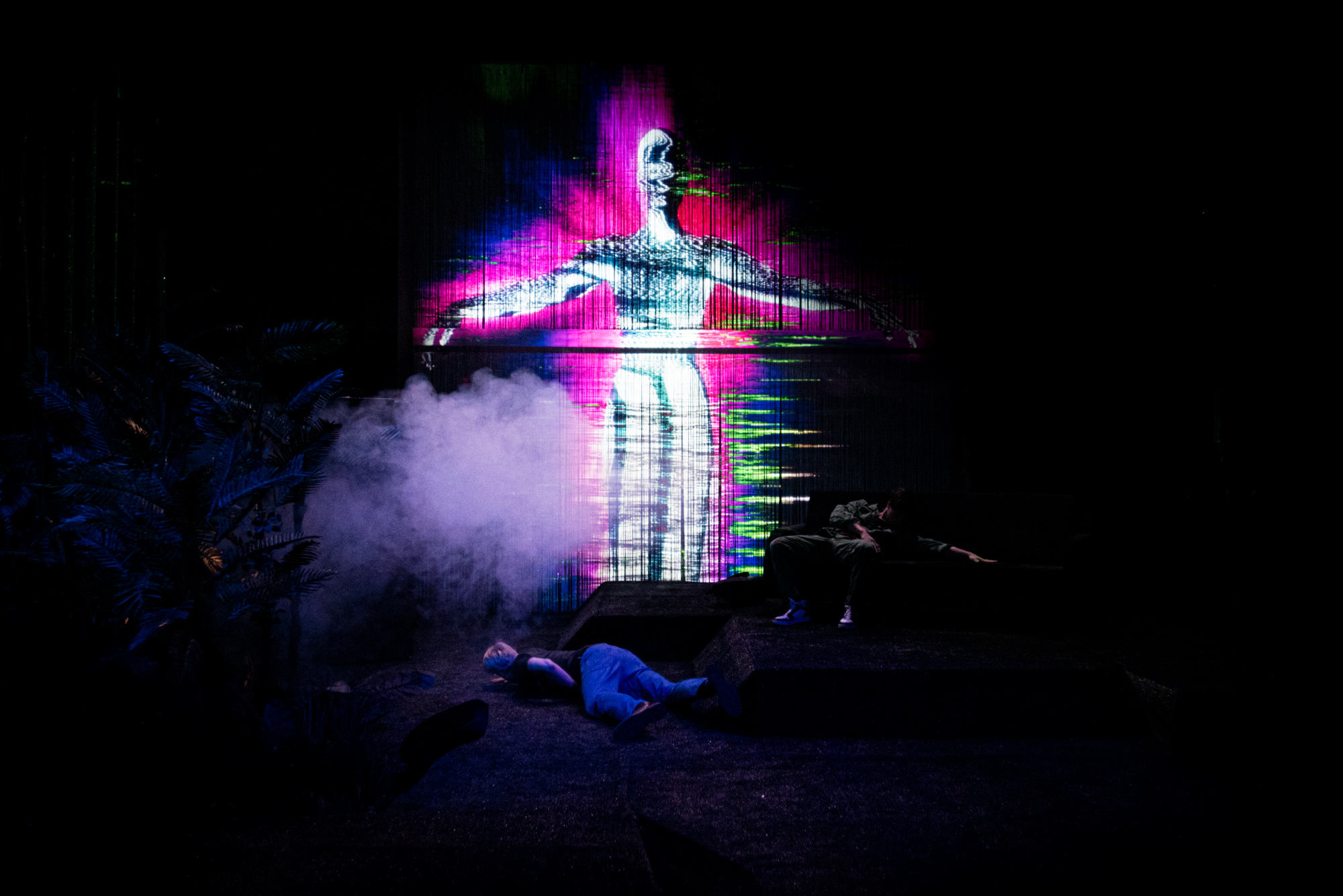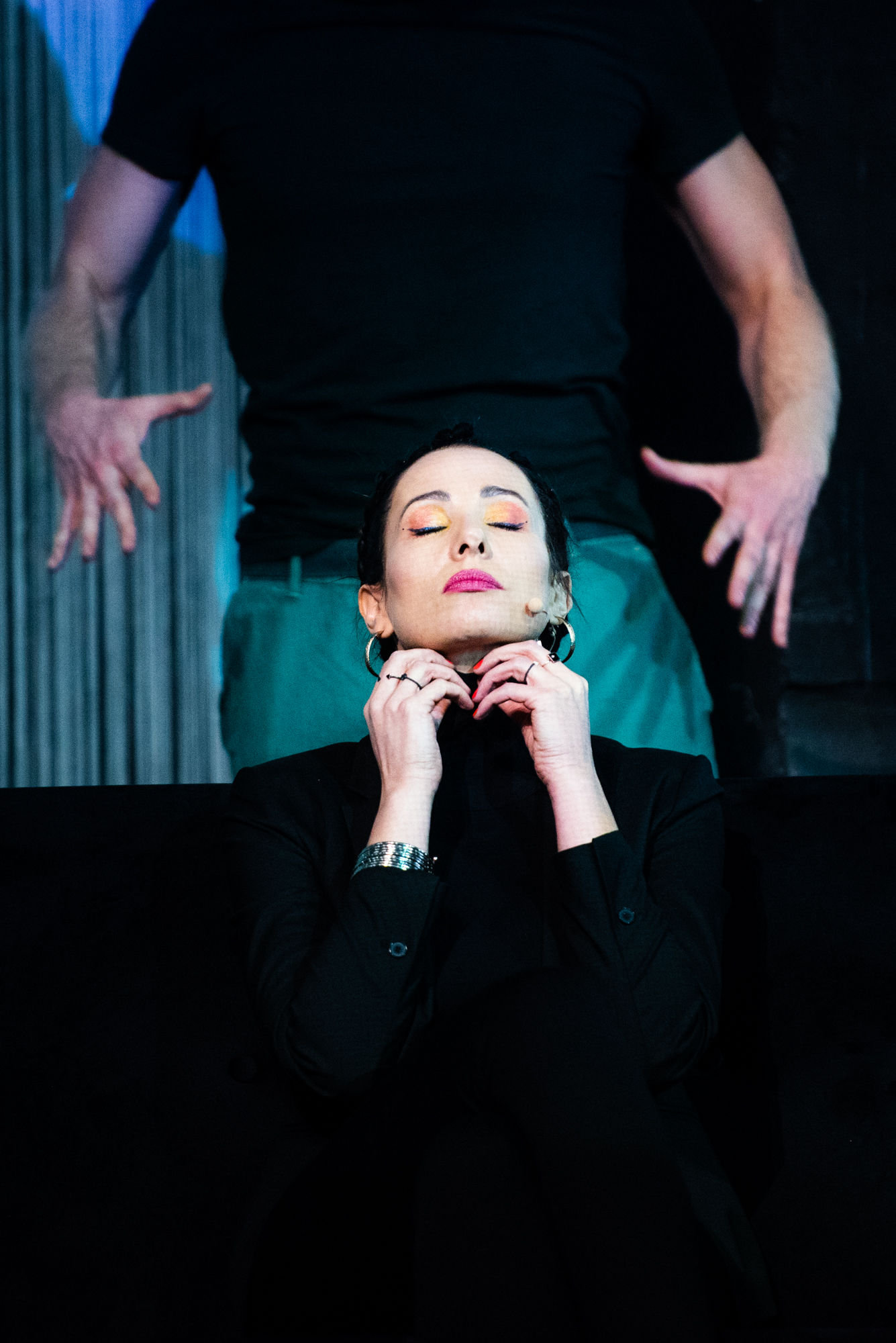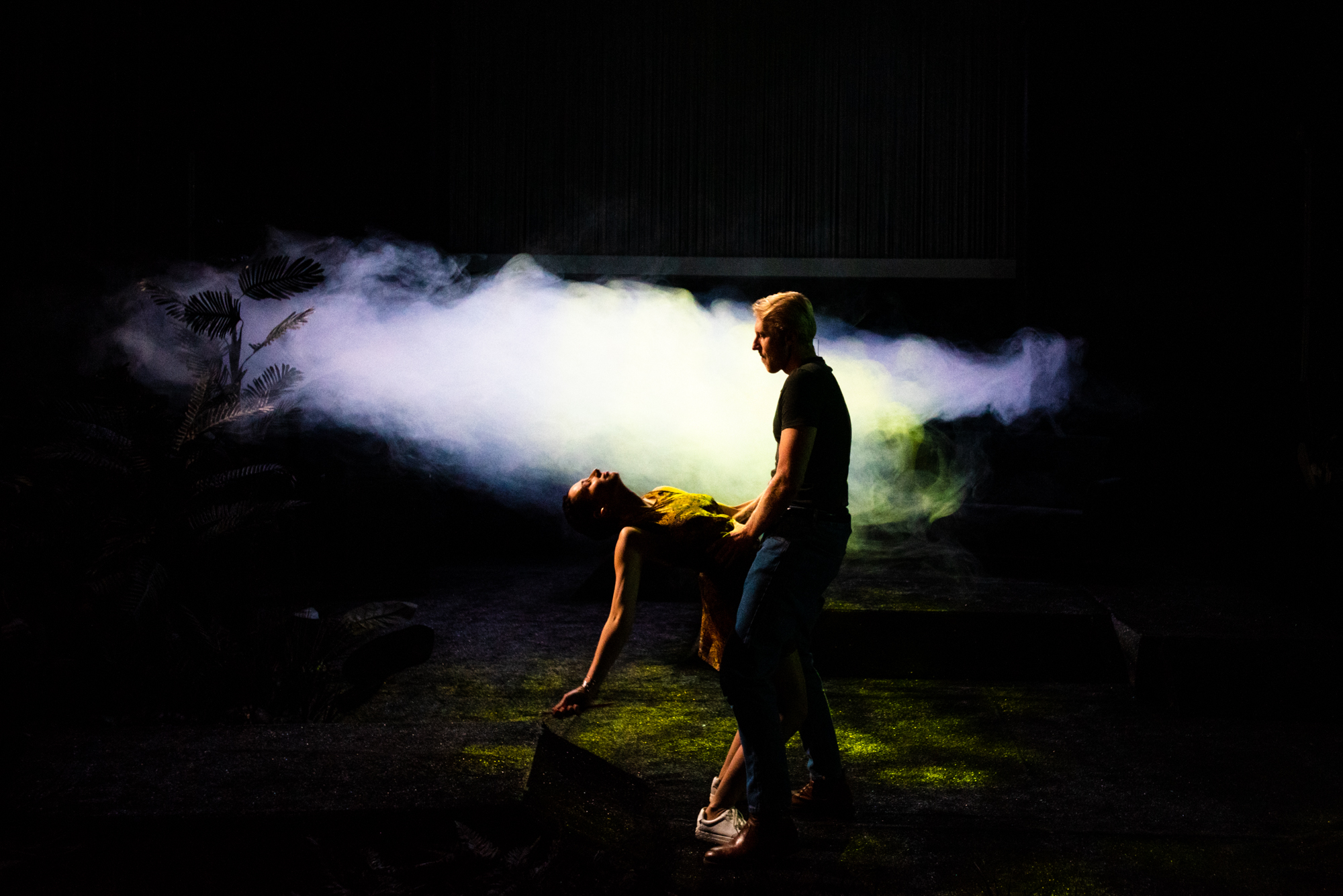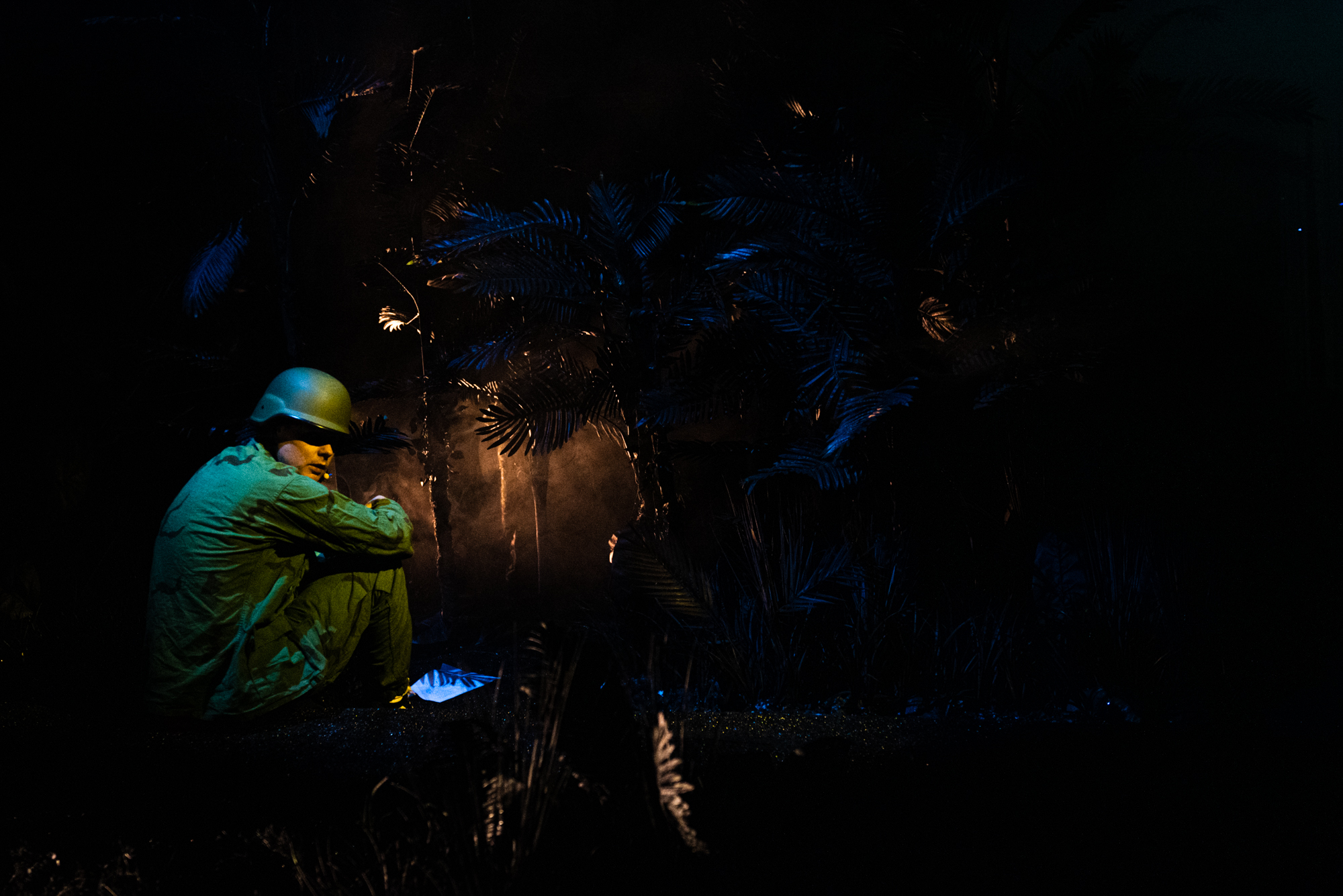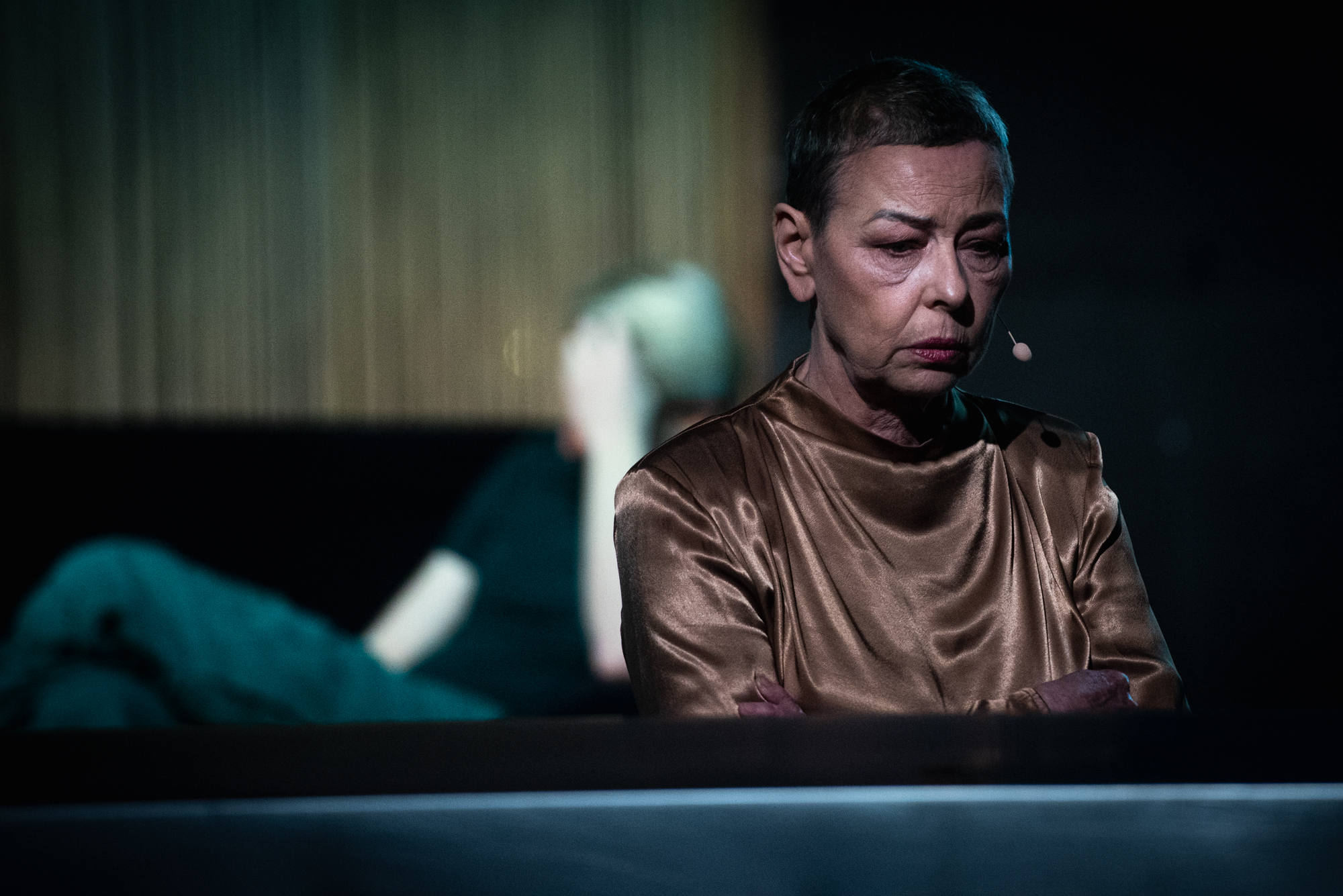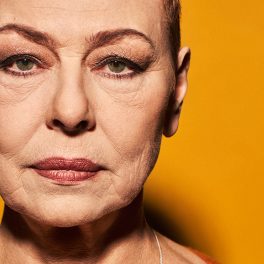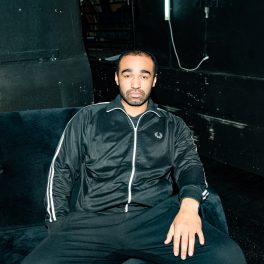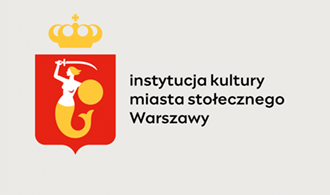-
Adaptation, direction
Wiktor Bagiński
-
Script
Wiktor Bagiński, Martyna Wawrzyniak
-
Premiere
March 5 2021
-
Duration
2 h
-
Tickets
Normal ticket: 70 PLN
Concessionary ticket: 50 PLN
Performance recommended for audience aged 16 and older.
Smoke machines used during the performance.
About the performance
In 1994, a nearly 30-year-old Nigerian, who lived in Poland, abandoned his newborn son. Thirty years later, his son embarks on a journey to the heart of his story. What is the truth and what is a myth in this family’s story? How to deal with racial stereotypes? How to free oneself from the hate?
“The Heart” is a documentary story of a young, black Polish man who embarks on a journey to find his biological father. The script is inspired by Joseph Conrad’s novella and based on Wiktor Bagiński’s autobiographical writings. The play attempts to find political meanings hidden in the director’s personal story.
photos by Monika Stolarska
From the director
“My tragedy is not about being black. My tragedy is not even about being a black Pole. Tragedy that I am most afraid of – to paraphrase James Baldwin – is about accepting theology that rejects life. By that I mean accepting a possibility of being a subhuman. If there is such possibility, or rather if there is ever a glimpse of such a thought, then a fight for one’s humanity begins. This performance abandons discourse in favor of experience. Experience of loss and abandonment, that brought suffering. However it is the search of the source of the birth of hatred that brings carefree affirmation of ABSENCE. Absence of a father.”
Wiktor Bagiński
Cast
Creators
direction, adaptation: Wiktor Bagiński
script: Wiktor Bagiński, Martyna Wawrzyniak
set design: Ania Oramus
costume design: Marcin Kosakowski
lighting design, video: Natan Berkowicz
music: Bartek Prosuł
choreography: Krystyna Lama Szydłowska
About director
Wiktor Bagiński – a graduate of the Faculty of Drama Directing at the Stanisław Wyspiański Academy of Theatre Arts in Cracow. Bagiński has also studied philosophy at the Warsaw University. As an actor he has played in a few theatre productions including: “Heroes of Future” directed by Markus Öhrn (produced by Komuna Warszawa, 2014), “Twerk Like a Teen Spirit” directed by Marta Ziółek (2015), “The Footballers” directed by Małgorzata Wdowik (produced by TR Warszawa, 2016), and “Vernon Subutex” directed by Wiktor Rubina (produced by The Juliusz Słowacki Theatre in Cracow, 2018), among others. He was Krzysztof Garbaczewski’s assistant during the production of “Cosmos” (produced by The Helena Modrzejewska National Stary Theatre in Cracow, 2016). In 2017 he directed his own play – “Negronauts” in The Zbigniew Raszewski Theatre Institute. Programme of the 8th Young Directors Forum in Cracow included a premiere of Bagiński’s performance titled “MARAT/SADE”; two years later, at the 10th Young Directors Forum he staged his next production titled “Othello”. Bagiński is a laureate of the 3rd Modelatornia competition (for the project: “Black
skin, white masks”). At the 8 th Sopot Non-Fiction Festival he presented his art performance “Negroisation” (Polish title” “Zmurzynienie”). In December 2020 he directed Molier’s comedy –
“Don Juan” in the Polish Theatre in Poznań. Wiktor Bagiński is a laureate of TR Debut 2019, awarded by the artistic team of TR Warszawa at the Young Directors Forum in Cracow. Within the frame of this award, in the 2021/2021 season he produced in TR Warszawa his next performance titled “The Heart” (premiered in April 2021). In September 2021 he established an Institute for Reducing Minority Stress WHITENESS [Polish name: Instytut Redukcji Stresu Mniejszościowego BIAŁOŚĆ].
Discussions
“The eagle in black. A Polish child”, Interview with Wiktor Bagiński conducted by Jędrzej
Słodkowski, “Gazeta Wyborcza”
J.S.: In “The Heart” you mix autobiographical motifs with themes from “Heart of Darkness” – a
Conradian journey to the source of evil. The play is also a form of reckoning with yourself. Your
protagonist is a prick, he has the makings of a tyrant, when unstable, he turns to drugs. Where did
this journey lead you to?
W.B.: I’ve finally stopped justifying all of my emotions with my skin color, the problem of racism. I’ve
also realized that the trouble I got into, came from the fact that I was searching for answers to very
basic questions but I didn’t get real answers from my family. I didn’t get false answers either. And if
you don’t get any answers, you start making up your own.
Reviews
-
The story presented in The Heart circulates between an
autobiography and a broadly defined post-colonial discourse. Physical
absence of a father, after whom the son has inherited his skin color,
becomes a pretext for creating a series of notions about the parent. They
revolve around cultural associations imposed on the Black people: from
stereotypes derived from the Heart of Darkness (Bagiński directly refers to
them in the video projection) to a model of African-American alive in the
US culture (its symbols include a Michael Jordan action figure, a childhood
keepsake). Suffice it to say, that the performance opens with Jan Dravnel
playing The End by The Doors on a guitar. This way Conrad’s novel is
directly linked to its modern, American version presented by Francis Ford
Coppola in Apocalypse Now. In the abovementioned measures we can find
another reflection of James Baldwin’s words: „American image of a Negro
lives also in his heart and when he surrenders to such image, his life will
not exist in any other reality”. In this context, Bagiński’s performance
attempts to personally diagnose and overcome this tendency, not
dissimilar to a tragic trap. -
This performance is not only significand and bold, but also deeply moving.
Inspired by Heart of Darkness by Joseph Conrad, The Heart is yet another
personal, identity statement in Polish theatre in recent time. Director and
co-author of the script (the other author is Martyna Wawrzyniak) Wiktor
Bagiński, a 28-year-old Pole with Nigerian roots, sets out to find his
absent father. However, as often is the case with such journeys, it turns
into a confrontation with his own ideas, stereotypes, fears and a
questions: “What do we owe to our parents and what do we inherit from
them?”. Racial context only raises the bar and temperature of this journey
to the heart of identity. A two-dimensional journey for Bagiński and his
protagonists. -
“(…) The Heart – similarly to Conrad’s Heart of Darkness and Coppola’s Apocalypse Now – is not even a narrative about disintegration but rather a disintegrated, decomposed narrative without a language. An experience of rape is an experience of subjective disintegration. So it’s not a cohesive plot, but rather the disintegration that is the key to this performance.”
-
“The Heart is a performance that you will not quickly forget. It’ll smolder somewhere in the back of your mind, ring with an echo of true emotions. Emotions that have not been not easily found in theatre lately, despite many premieres presented after months of absence. And finally, I’d like to stress again the precise acting, which despite being so intimate, extends far beyond obvious naturalism and conventional authenticity.”
-
“Adaptation of the classical works by Conrad and Coppola combines here with – an
autobiographical? – story of a confused young man. The fact that he is black, provides an impulse to research the sense and scope of racial identity discourse in Poland. But it soon turns out that the performance extends far beyond and touches such issues like: violence, abortion, searching for a father, and women’s rights. At times it is hilarious, but there are also scenes that I can compare to an emotional hurricane. The whole cast gives here a show of unobvious and natural acting which – seemingly – crosses the border between creation and privacy.” -
“(…) And so we have a 30-year-old black protagonist (fantastic Dobromir Dymecki, with his fair blonde hair fits in perfectly), who is the director’s alter ego. But the thing is not about a complex identity of a black-skinned Polish man or the search for it (well, maybe indirectly). We’re watching a performance about identity, yes, but the question is not: “who am I?” but rather: “where is my father?” Who was he? Where to find him? In Kenia? Or maybe in Abuja? And – why did he leave? A heroic mother who raised a black kid in a small town (equally fantastic Magdalena Kuta) avoids these questions time and time again until a time for a more serious conversation finally comes…”
-
“(…) The Heart, produced by TR Warszawa, is an autobiographical story loosely inspired by Conrad’s novel. The script was created by the director and Martyna Wawrzyniak. Bagiński, raised in Dzierżoniów, has Nigerian roots – from his father’s side, whom he’s never met. His mother, despite the boy’s insistence, does not reveal many details of the short, but life-changing relationship. The director launches his stage alter ego, played by „wasn’t there anyone whiter?” Dobromir Dymecki, on a metaphorical voyage to a “jungle”, the darkness of his heart, on a search for so-called heritage. And he asks if not knowing his biological father isn’t better, after all? It frees him from additional baggage. And a paradigm of life force – in the patriarchal culture associated with a man, has always been at the protagonist’s fingertips – in the person of his mother (phenomenal role of Magdalena Kuta), who, by keeping details of her and his father relationship secret, gave her son a chance to mold himself independently from that story.
-
“Accepting yourself is the hardest. In the fifth premiere in the flagship TR Debut programme, where the exceptional directors of the young generation are given a chance to produce their performances, a black Polish actor and director Wiktor Bagiński struggles with his roots. He’s never met his father, a Nigerian, and after many years he attempts to determine, where he comes from. In this repeatedly rescheduled trip to Africa, Conrad’s Heart of Darkness will be his mirror. The protagonist gets involved with an older girl from Kenia and has to face some difficult decisions. A feeling of being defective grows within him. The color of his skin becomes a stigma and an obstacle that is difficult to overcome. Despite the caliber of the topic that he explores, Bagiński does not shy away from comedy – the scene in a therapist’s office, where the protagonist, after 10 years apart, meets his lover, gives such opportunities and Dobromir Dymecki boldly grabs them. Elements of “theatre within the theatre” that expose the fictionality of the characters and situations presented on stage, is another
source of laughs.” -
“(…) The personal story of the protagonist of The Heart – a modern-day Marlow – is woven of
literary/philosophical fragments that represent classical studies on the subject of blackness. The central problem of The Heart’s protagonist is experiencing blackness defined as a particular condition, where racist discourse and stereotypes concerning non-white skin color, that constantly affect the hero, clash with an attempt at self-expression.” -
“(…) With each scene, Bagiński changes the way the audience perceives the performance and thus leaves them with a feeling of uncertainty. A simple, nearly soap-style story presented by the actors, sometimes in an exaggerated manner, is shown from various angles and in different ways. It pinches a little, it’s uncomfortable, and leaves the audience with a difficult question about the assessment and meaning of what they’ve just seen. This feeling of uncertainty seems to be the most interesting thing in this performance.”
Production
director’s assistant: Wojciech Sobolewski
stage manager: Piotr Piotrowicz
production manager: Magda Igielska
production cooperation: Maria Herbich
Inspired by Joseph Conrad’s novella “Heart of Darkness”
TR Debut
About the director
Wiktor Bagiński is a fourth-year drama directing student at the AST National Academy of Theatre Arts in Kraków. He has also studied philosophy at the University of Warsaw. As an actor he played in a few performances including: Heroes of Future directed by Markus Öhrn (produced by Komuna Warszawa, 2014), Twerk Like a Teen Spirit directed by Marta Ziółek (2015), Footballers directed by Małgorzata Wdowik (produced by TR Warszawa, 2016), or Vernon Subutex directed by Wiktor Rubin (produced by the Juliusz Słowacki Theatre w Kraków, 2018). He assisted Krzysztof Garbaczewski on the production of Cosmos (produced by The Helena Modrzejewska National Stary Theatre, 2016). In 2017 Bagiński directed his own play Negronauts in The Zbigniew Raszewski Theatre Institute. At the 8th Young Directors Forum in Cracow he directed The Persecution and Assassination of Jean-Paul Marat as Performed by the Inmates of the Asylum of Charenton Under the Direction of the Marquis de Sade. He is the laureate of the 3rd Modelatornia competition (project: Black skin, white masks). In June 2020 Bagiński produced The Screens in The Polish Theatre in Poznań.
New Talents Line / TR Debut
TR Warszawa acts as an incubator for new talents and cutting edge projects. Each year in the programme there are at least two performances or performative readings by creators that make their debut in Warsaw: directors and/or playwrights. We do not build a permanent team of cooperating artist but instead we work towards the growth of the Polish theatre in general, with particular focus on the art of direction. TR Warszawa identifies new talents and fulfills the role of an expert while building the knowledge equity of the new Polish theatre.
The search for new talents takes place through competitions – restricted and open (TR Debut, TR Area, pitchings); internship, assistantship and residency application programs; research conducted at the faculties of directing at drama schools, theatre festivals and partner theatres abroad. The creators are selected by a special team made up of the representatives of TR Warszawa artistic team.
We cooperate with people who can think creatively about the theatre and performative arts, who are open to experimenting with other constituents of art and interested in developing their work with the actor’s team; creators who are engaged in the problems of the modern world, for whom theatre is a space of freedom, place where the state of a human and the world can be explored.
Read more about our programming lines.
